UP ON THE ROOF
Tennessee Williams’ complete oeuvre went from totally brilliant to completely flat as he evolved in his work, beginning in the early 1940s and ending in the early ’80s. Considering that Cat on a Hot Tin Roof (1955) is considered one of his top five dramas, it’s a logical choice for classical theater company Antaeus to make it the premiere production at their new home space in Glendale. Rooting-out Williams’ 1974 revision’”which includes restored text excised from the original’”may not have been a necessary choice; just shy of three hours, this version isn’t a leaner meaner cat. And while the new space may be too tiny too hold the gigantic script and awesome performances, it’s still Williams and Antaeus at their best.
It’s familiar territory for Williams: Another Southern dysfunctional family, this time in Mississippi, where the wealthy Pollitt family members are at each other’s throats. It’s patriarch Big Daddy’s 65th birthday party and the youngest son Brick, totally estranged from his family, is quickly drinking himself to death after the suicide/drunken death of his closest friend, Skipper, a relationship that dares not speak its name. His frustrated wife, Maggie, the “cat” of the title, needs him to sober up so he won’t destroy their chances of inheriting the 27,000 acres of prime agricultural land amassed by Daddy, who is dying of cancer (but has yet to be fully informed of that). Rounding out the broken brood are Big Mama, a nervous wreck of Southern stereotyping; the eldest son Gooper and his expectant wife Mae, and two of their “no-neck-monster” children (pared down from five in the original).
Many members of this company regularly work in film and TV, so every production is double-cast to ensure that the show goes on. The ensembles are named after key words or phrases in the play; here we have “The Buttered Biscuits” and “The Hoppin’ Johns.” The latter’”named after Carolina Peas and Rice, a southern dish consisting of black-eyed peas, rice, chopped onions, bacon and salt’”is overall the better of the two casts, specifically with Maggie (Linda Park), Brick (Daniel Bess), Big Daddy (Mike McShane), and Mae, aka Sister Woman (Tamara Krinsky). The bitchy cattiness between Maggie and Mae adds much needed humor, and the actresses never stray from their characters’ basic conflicts and needs.
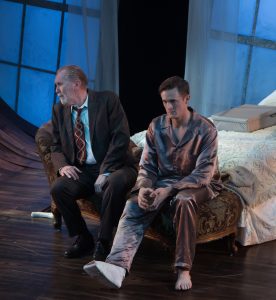 The issues that made Williams’ play so volatile at the time it was written still resonate today: The basic reasoning behind Brick’s drinking (his conflicted sexuality); Gooper and Mae’s desperate need to claim the inheritance for themselves; and blowhard Daddy’s contempt for his vivacious wife, and his terror of dying.
The issues that made Williams’ play so volatile at the time it was written still resonate today: The basic reasoning behind Brick’s drinking (his conflicted sexuality); Gooper and Mae’s desperate need to claim the inheritance for themselves; and blowhard Daddy’s contempt for his vivacious wife, and his terror of dying.
If there’s any fly in Williams’ updated ointment, it’s that the play is over-written, especially in the first act where Maggie talks non-stop (an amazing feat of memorization for any actress), and Brick is essentially a just-out-of-the-shower (nudity included), passive-aggressive block of hostility. It isn’t until the second act confrontation between Daddy and Brick that the essential problems with this family are brilliantly laid out (and watching McShane and Bess vocally and physically thrash out Brick’s internalized homophobia, with both men’s constantly surprising outbursts, make for dynamic theater). Unnecessary in this revision is the six-time use of the F-Bomb; all-too-commonplace in our decade, wouldn’t this have been verboten in the 1950s?
Antaeus will no doubt have to deal with this in the future, but the smallness of their 80-seat-theatre’s stage makes for unneeded claustrophobia, and Steven C. Kemp’s expressionistic set, the visual unraveling of the house, while imaginative, didn’t help in lessening the shut-in feeling of the production. Still, director Cameron Watson (Top Girls), producing theatrical magic yet again, keeps the drama on target. Terri A. Lewis’s costumes were extremely apt for character-building, especially her bright-hued red-coral party-dress for Maggie and the period-tacky avocado-green pregnancy-dress for Mae. Thought and talent permeates this professional production, and the colossal talent in colossal roles, even on a tiny stage, is something to see.
photos by Steven C. Kemp
Cat on a Hot Tin Roof
Antaeus Theatre Company
Gindler Performing Arts Center, 110 East Broadway in Glendale
Thurs and Fri at 8; Sat at 2 & 8; Sun at 2
ends on May 7, 2017 EXTENDED to May 14, 2017
for tickets, call 818.506.1983 or visit Antaeus
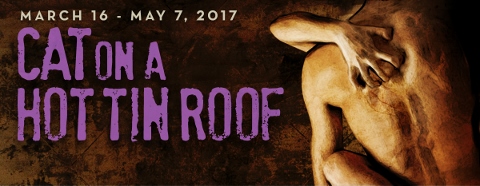
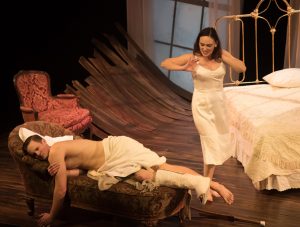
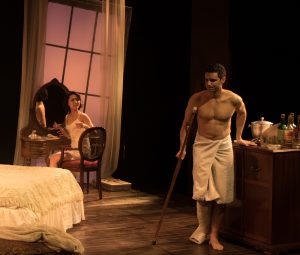
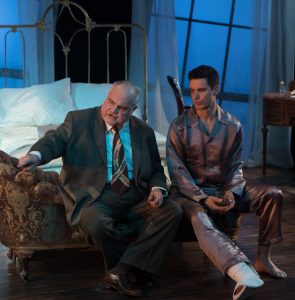
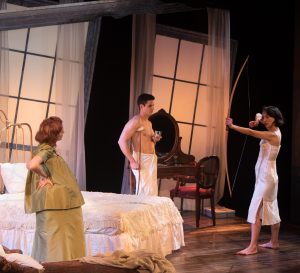

{ 3 comments… read them below or add one }
I’d always thought Brick’s deterioration was a result of his “conflicted sexuality,” but when I read the 1974 version and saw that same version performed in the Berkshires, it seemed to me that while Williams made clear that Skipper’s love for Brick was homosexual, he was trying hard to show that Brick’s for Skipper was not, even though others will always assume that it is.
That’s fascinating, Gesualdo. But I wonder, if Brick isn’t suffering from sexual identity crisis, where is the conflict? Why would a dead character be the one to work something out?
The conflict is still mendacity versus truth, which conflict pervades the entire family. Brick’s descent into alcoholism and self-loathing (as I saw it) resulted from his rejection of Skipper, like Blanche’s of her young, beautiful husband; in Brick’s case, not because he himself is a latent homosexual but because Skipper was definitely homosexual, and Brick is disgusted at his resulting disgust for Skipper and his failure to support or understand or sympathize with him. I realize that I’m in the minority on this and that his rejection of Skipper can be attributed to “conflicted sexuality†in addition to or instead of his disgust. Big Daddy asks him what Brick’s left out of his story about Skipper and calls Brick’s reply half-ass and tells him bluntly that Brick wouldn’t face Skipper’s “truth†with him; even though Brick asserts the truth is only Skipper’s and not his, it’s pretty easy to guess what that “truth†is. In any event, I thank you for your review and reply; you’ve prompted me to re-read and re-consider the play.